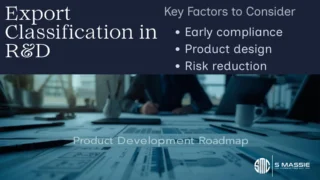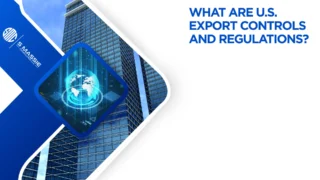Both the ITAR and the EAR emphasize the importance of employee education and training. ITAR requires all employees to undergo training on a yearly basis, while EAR strongly recommends regular training programs. Understanding why regular training is pivotal for export compliance is essential for businesses aiming to operate seamlessly within these regulatory frameworks.
The Fundamental Role of Training in ITAR and EAR Compliance
1. Knowledge Empowerment
Regular training sessions equip employees with the knowledge they need to understand the intricate details of export regulations. ITAR and EAR guidelines are complex and ever-evolving, and staying updated is crucial, especially when they involve ITAR products or technology that are a matter of National Security. Training sessions provide employees with the tools to recognize prohibited activities, understand licensing requirements, and navigate potential compliance pitfalls.
2. Mitigating Risk and Ensuring Accuracy
By educating employees regularly, companies can significantly reduce the risk of inadvertent violations. Understanding the specifics of what can and cannot be exported, as well as recognizing red flags, helps prevent costly errors. Moreover, training fosters accuracy in documentation, ensuring that export paperwork and records are in compliance with regulations.
3. Cultivating a Compliance Culture
Regular training sessions not only inform employees about regulatory requirements but also foster a culture of compliance within the organization. When employees understand the importance of compliance and its impact on the company, they are more likely to integrate compliance practices into their daily work routines.
4. Adapting to Regulatory Changes
Export regulations are subject to frequent updates and changes. Regular training sessions keep employees abreast of these modifications, helping companies adapt quickly and seamlessly to new compliance requirements.
The Way Forward: Implementing Effective Training Programs
To ensure compliance and reap the benefits of regular training, companies should consider implementing the following strategies:
- Comprehensive Training Modules: Develop training materials tailored to the specific needs of the organization, covering relevant topics related to ITAR and EAR compliance.
- Engaging and Interactive Sessions: Utilize various formats such as workshops, seminars, online courses, or guest speakers to make training sessions engaging and interactive.
- Continual Evaluation and Feedback: Regularly assess the effectiveness of training programs and solicit feedback from employees to refine and improve the training experience.
- Top-Down Commitment: Demonstrate leadership commitment to compliance by encouraging participation in training sessions from the top down.
Ongoing Commitment
In conclusion, compliance with export regulations is not a one-time task; it’s an ongoing commitment that requires continuous education and training. By investing in regular training programs for employees, companies can enhance their compliance efforts, mitigate risks, and foster a culture of adherence to export regulations, ensuring sustainable and lawful international business operations.
“It is often said that ‘you don’t know what you don’t know.’ That is precisely why I have been conducting export compliance training for companies around the US, both in person and virtually to allow employees from remote locations to attend. At S Massie Consulting, we offer a variety of training programs to keep businesses updated and keep export compliance front of mind for all employees.” – Sarah Massie, President of S Massie Consulting
Sarah Massie conducting a training on Navigating Regulated Exports and Strategies
Contact us to schedule a consultation or compliance review.







